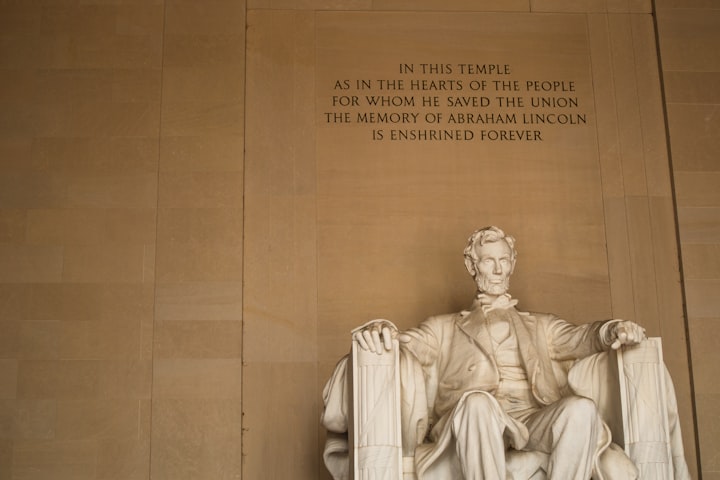The Life and Legacy of Abraham Lincoln
From Log Cabin to White House: The Rise and Legacy of Abraham Lincoln

The best way to predict your future is to create it.
- Abraham Lincoln
Introduction
Abraham Lincoln, the 16th President of the United States, is one of the most iconic and revered figures in American history. He is best known for leading the country through its Civil War—its bloodiest war and perhaps its greatest moral, constitutional, and political crisis—and for his role as one of the principal architects of the modern American state. Despite his relatively short time in office, Lincoln's contributions to the nation have had a lasting impact and his leadership during the Civil War helped to preserve the Union, abolish slavery, strengthen the federal government, and modernize the economy.
Early Life and Career
Abraham Lincoln was born on February 12, 1809, in a one-room log cabin in Hardin County, Kentucky. He was the second of three children born to Thomas and Nancy Lincoln. His family was poor, and Lincoln received little formal education, but he was an avid reader and taught himself about a wide variety of subjects.
In 1830, Lincoln's family moved to Illinois, and he began a career as a general store owner, postmaster, and surveyor. He also became involved in local politics, and in 1834, he was elected to the Illinois state legislature as a member of the Whig Party. He served four terms in the legislature and during this time, he honed his skills as a speaker and a debater.
In 1846, Lincoln was elected to the U.S. House of Representatives, where he served one term. During his time in Congress, he opposed the Mexican-American War and the expansion of slavery into the western territories. He did not seek re-election in 1848 and returned to Illinois to practice law.
The Road to the Presidency
In 1854, the Kansas-Nebraska Act was passed, which effectively repealed the Missouri Compromise and opened new territories to the expansion of slavery. Lincoln, along with other members of the newly formed Republican Party, strongly opposed the Act and he began to re-enter politics.
In 1858, Lincoln ran for the U.S. Senate against Stephen Douglas, a Democrat and the author of the Kansas-Nebraska Act. Though Lincoln lost the election, he gained national attention for his speeches and debates with Douglas.
In 1860, Lincoln was nominated as the Republican candidate for president. He campaigned on a platform of preserving the Union and opposing the expansion of slavery. He won the election in a landslide and was inaugurated as president on March 4, 1861.
Leading the Nation Through War
In April 1861, Confederate forces attacked Fort Sumter in South Carolina, marking the beginning of the Civil War. Lincoln called for 75,000 volunteers to join the Union army and he issued a proclamation declaring the Confederate states to be in rebellion.
Throughout the war, Lincoln served as commander-in-chief of the Union army and as the head of the U.S. government. He was faced with the difficult task of balancing military strategy with political considerations and public opinion. He also had to grapple with the issue of slavery, which he initially wanted to preserve in the border states, but then came to see as a moral and military necessity to abolish it.
In 1863, Lincoln issued the Emancipation Proclamation, which declared all slaves in Confederate states to be free. This was a significant turning point in the war, as it shifted the focus from preserving the Union to abolishing slavery. In 1864, Lincoln was re-elected as president, in part due to the Union army's military successes and the growing support for the abolition of slavery. On January 31, 1865, the U.S. Congress passed the 13th Amendment to the Constitution, which abolished slavery. The amendment was ratified by the states in December 1865, solidifying one of Lincoln's main goals during his presidency.
On April 9, 1865, Confederate General Robert E. Lee surrendered to Union General Ulysses S. Grant, effectively ending the Civil War. Lincoln's leadership during the war helped to preserve the Union, abolish slavery, and bring about a sense of unity and national purpose.
Tragically, Lincoln's life and presidency were cut short when he was assassinated by John Wilkes Booth on April 14, 1865, just five days after the war's end. He was the first president to be assassinated in U.S. history, and his death was met with shock and mourning across the country.
Conclusion
Abraham Lincoln's legacy is one of leadership, sacrifice, and the triumph of good over evil. He led the nation through its darkest hour and helped to preserve the Union, abolish slavery, and shape the nation into what it is today. His speeches and writings, such as the Gettysburg Address, continue to inspire and educate generations. He is remembered as one of the greatest American presidents and his life and accomplishments will always be an important part of American history.
About the Creator
Shyam Sathish
I am Creative writer who possess the magic in weaving words and making a new world out of it.
Reader insights
Outstanding
Excellent work. Looking forward to reading more!
Top insights
Expert insights and opinions
Arguments were carefully researched and presented
Eye opening
Niche topic & fresh perspectives






Comments
There are no comments for this story
Be the first to respond and start the conversation.